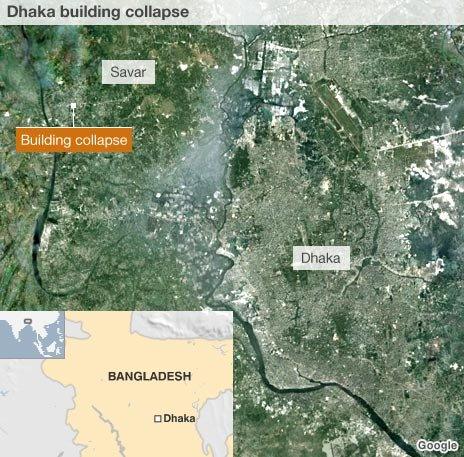Dhaka building collapse: Dozens found alive in rubble
- Published
Footage shot by a fire service volunteer shows the scene inside the building
Dozens of people have been found alive in a room in the ruins of a building outside the Bangladeshi capital, Dhaka, a day after it collapsed.
Bangladeshi television broadcast images of the operation at the site of the collapse in the Savar area, which killed at least 250 people.
It is thought many more people may still be unaccounted for.
Police said the owners of factories in the building had ignored warnings about cracks appearing on Tuesday.
Some 2,000 people were in the Rana Plaza building in Savar, some 30km (20 miles) outside Dhaka, when it collapsed suddenly on Wednesday morning.
The High Court has summoned the Rana Plaza building owner and senior managers of the factories to appear before judges on 30 April, local media report.
The factory owners are said to have gone into hiding.
Prime Minister Sheikh Hasina has said those thought to be responsible for the disaster, including the owner, would be prosecuted.
"Wherever he is, he will be found and brought to justice," she told politicians.
Bangladesh is holding a day of national mourning for the victims.
'I want to live'
Teams from the army, the fire service and border guards have been working around the clock at the site to find survivors, using heavy lifting gear, tools and their bare hands.
Officials say they have now found 250 bodies in the rubble. Thousands of people have gathered at the site, waiting for news of relatives.
On Thursday, Brig Gen Mohammed Siddiqul Alam Shikder, who is heading the rescue mission, said 40 people had been located in the rubble, trapped inside one room.
The news was greeted with jubilation at the scene, the BBC's Anbarasan Ethirajan reports.
However later reports put the number found at 24.
The military said at least 12 of the group had since been pulled free.
One rescue official told the BBC that the group was found after they were heard screaming in the rubble.
Search teams have been dropping water bottles and food items to other survivors who are still trapped.
One trapped man, Mohammad Altab, was able to speak to an Associated Press reporter, telling him he had two children.
"I want to live. It's so painful here," he said.
Another man, trapped deeper in the rubble, begged for rescue, telling the reporter: "It's hard to remain alive here. It would have been better to die than enduring such pain to live on."
Local hospitals have been overwhelmed with the arrival of more than 1,000 injured people.
Are clothes shoppers concerned about Bangladesh?
Industry criticised
Our correspondent says the rescuers intend to continue their operation for several days, but that they are aware time is now running out.
Bangladesh has one of the largest garment industries in the world, providing cheap clothing for major Western retailers which benefit from its widespread low-cost labour.
But the industry has been widely criticised for its low pay and limited rights given to workers and for the often dangerous working conditions in garment factories.
Primark, a clothes retailer with a large presence in Britain, confirmed that one of its suppliers was on the second floor of the Rana Plaza, and said it would work with other retailers to review standards.
US discount giant Wal-Mart said it was still trying to establish whether its goods were being produced at the Rana Plaza.

A company called New Wave, with two factories in the building, supplies firms from around Europe, the US and Canada, while Spanish retailer Mango said it had been in production talks with a supplier at the factory.
Labour rights groups say the companies have a moral duty to ensure their suppliers are providing safe conditions for their employees.
"These are billion dollar companies. They have a huge amount of power to change the way that building safety is accepted here," Gareth Price-Jones, Oxfam's country director for Bangladesh, told Reuters.
Thousands of garment workers in other areas of Dhaka have taken to the streets and blocked roads to protest about the deaths of the workers in Savar.
Bangladesh's Daily Star newspaper reported that protesters had clashed with police, resulting in some injuries.

- Published25 April 2013
- Published25 April 2013
- Published25 April 2013
- Published25 April 2013